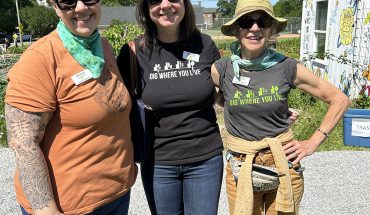The creator of a Durham-based soapmaking company explains how the circular economy has led to business success.
by Andrea Rice
Photos | photography by Allie Mullin Photography
Just off I-85, an unassuming glass-walled storefront on Guess Road in Durham is making a big environmental impact. Fillaree, a zero-waste soapmaking factory run by a team of less than five women, pumps out 240 gallons of all-natural vegan soap, 1,500 plant-based body bars and 60 gallons of Clean Dream, a household cleaning spray, each month. In 2019, this small but mighty factory managed to produce just eight pounds of trash for an entire year.
Founded in 2014, Alyssa Cherry, a 39-year-old mother of two, started Fillaree in her home kitchen as a means of fulfilling what she saw as a need for nontoxic refillable soap and household cleaners for her eco-conscious family. Cherry taught herself how to make soap from scratch using only high-quality, environmentally friendly materials, and soon began selling her products at a farmers market stand in Durham.
Three years later, Cherry expanded her business and opened a storefront to meet a growing demand for Fillaree’s “wash, sanitize and refill” method. Subscribers to the refill program receive a 32 ounce vessel of liquid soap, refill their containers, then send it back to Fillaree in a prepaid envelope where it’s washed, sanitized and refilled, and then shipped off to its next destination. Today, Fillaree has over 400 nationwide subscribers and 40 refill stations around the U.S. (Woodstock, N.Y., Los Angeles, Atlanta), many of which are right here in the Triangle, from The Zen Succulent in Raleigh to the Durham Co-Op Market to Be Pure Beauty in Carrboro. Many local establishments carry (and refill) Fillaree’s soaps as well, including Trophy Brewing Co., Tazza Kitchen and CompostNow.
There has maybe never been a better time than now to be in the soapmaking business. This past March, even amidst global economic fallout, Cherry exceeded her Kickstarter goal of raising $18,000 to bring her new product, Refillable Condensed Soap, to mass market, which Cherry says will have to potential to divert over 500,000 plastic bottles from the waste stream. And despite that the establishments that Cherry regularly conducts her business with are temporarily closed to the public due to COVID-19, you can still place an order for Fillaree’s refillable soaps and household cleaners online and arrange for delivery or no-contact local pickup.
I caught up with Cherry to learn more about the strategy behind her sustainable business model and why refilling and reusing is the future of the green economy.
Why is refillable soap important—maybe now more so than ever?
It’s about feeling empowered and having control over the impact that you’re making on the environment and the planet. While we can do a lot of things to reduce our carbon footprint, like reusable coffee cups and bags, when it comes to other consumables like food, body care, personal care and household items, it’s difficult to consume in a way you feel good about. That’s why refillable of soap is so important. Plastic pollution is a huge problem— China has stopped taking all of our imported recycled plastics—and we all need soap, especially these days! We all need to be washing our hands to keep our bodies healthy and families safe. But you don’t always need to buy a new container every time. There’s a way to consume your soap or household good that creates no waste —you can buy a glass or metal bottle from us or use one of your own, and refill that bottle over and over again for next 5-10 years. You reduce your waste through reuse. I’ve had same glass bottle for close to seven years and I’m really proud of that; it makes me feel good that I haven’t thrown away 80 bottles of soap.
How is it possible that your Durham soap factory managed to produce just eight pounds of trash for an entire year?
It’s all about creative reuse. We partnered with Gather Green, a waste recovery consulting company that helped us create a waste diversion system for some of those harder-to-recycle items. For instance, we donated plastic film and drums to The Scrap Exchange. It’s really about getting the whole team on board and committed to doing what we can to not make unnecessary waste, then figuring out how to creatively divert and reuse necessary waste—whether that’s composting or returning items to the manufacturer. It’s a lot of extra work, but we were able to do it and feel good about it.
How does Fillaree’s “circular economy” function?
The way that most people consume goods is the manufacturer makes something that gets sold to a store, you take it home, consume it, and then it gets thrown away, composted or recycled. That’s the linear economy of waste. The circular economy is where you have the vessel or packaging for the good, you take it home and use the good, then you take it back to the manufacturer and it’s used again, which promotes reuse versus disposal. When we started in 2014, Fillaree was one of the first personal care companies to facilitate a circular economy for soap. We are the milk people of soap! And now there’s other amazing companies that have seen the value in refillables and reusables that are doing condensed soaps, concentrates and tablets, and refillable bottles. It’s a growing market—not a trend—and it’s here to stay.
Now that your Refillable Condensed Soap Kickstarter project is funded, how do you plan to reach your goal of preventing half a million plastic bottles from entering the landfill?
By reaching 50,000 people with our product. Based on current growth trends we could probably hit that goal in about two and a half years. Each individual bottle of condensed soap can prevent up to 16 plastic bottles of conventional soap. When people buy our condensed soap, they will be reusing the same bottle, and won’t have to rely on buying other bottles and then disposing of them—and most plastic ends up in the landfill anyway due to contamination. Because we have the circular economy of consumption built into our business model, those bottles will be prevented from entering the waste stream. It’s so important for companies to realize this—and become more innovative with consumption by creating systems of reuse. I think that’s where we’re going to see the most impact.
How has being a refiller impacted your lifestyle and your family?
Well, it’s made us more frustrated when you realize how hard it is to reuse certain things, or in recognizing the frivolity of all the excess plastic packaging. My kids have grown up in a culture of being hyper-aware when it comes to single-use plastics; it’s been good for them to talk about it and help spread the information. As a family, we all feel healthy and love being able to wash our hands with this great, nontoxic, greywater safe soap. We’re surrounded by a community of likeminded individuals who share our mission. Even still, it can be frustrating to realize how difficult it is to lead a truly zero-waste lifestyle. It’s really hard for me to get my personal trash can close to eight pounds! It really is a journey.





